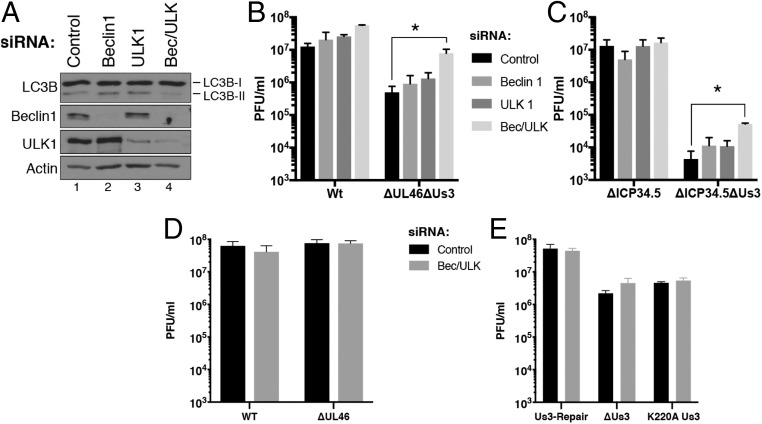Fig. 6.
Beclin1- and ULK1-dependent autophagy restricts productive HSV-1 replication and are antagonized primarily by Us3. (A) NHDFs were treated with nonsilencing (control), Beclin1-specific (Beclin1), ULK1-specific (ULK1), or a mixture of Beclin1- and ULK1-specific siRNAs (Bec/ULK). After 72 h, total protein was isolated, fractionated by SDS/PAGE, and analyzed by immunoblotting with the indicated antibodies. (B) NHDFs treated as in A were infected (MOI = 2.5 × 10−3) with WT HSV-1 Kos37, or a Kos37 derivative doubly deficient for Us3 and VP11/12 (ΔUs3ΔUL46). After 3 d, infectious virus produced was quantified by plaque assay in Vero cells. Bars represent mean + SEM of at least 3 experiments. Statistical analysis was performed using the Student’s t test. *P ≤ 0.05. (C) As in B except cells were infected with a Patton strain HSV-1 doubly deleted for ICP34.5 and Us3 (Δ34.5-B2ΔUs3) or the ICP34.5-deficient parental virus (Δ34.5-B2). (D) NHDFs treated with nonsilencing (control) siRNA or a mixture of Beclin1- and ULK1-specific siRNAs (Bec/ULK) were infected (MOI = 2.5 × 10−3) with WT HSV-1 Kos37 or UL46-deficient Kos37 derivative virus (ΔUL46). (E) As in D except NHDFs were infected with the indicated HSV-1 F-strain Us3-deficient or Us3-repaired virus. Infectious virus was quantified as in B. Bars represent mean + SEM of at least 3 experiments and statistical differences were not detected between control and Bec/ULK siRNA-treated samples using a Student’s t test.

